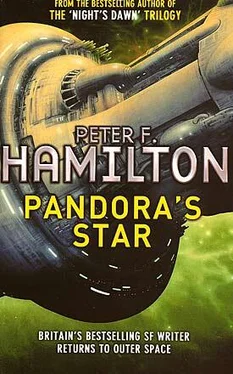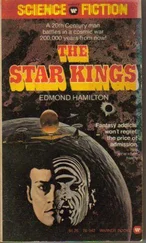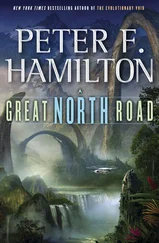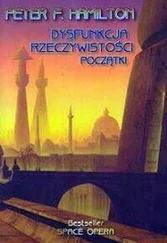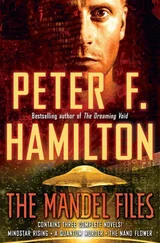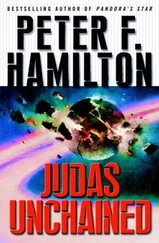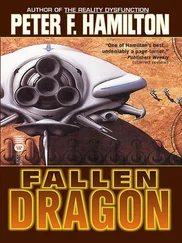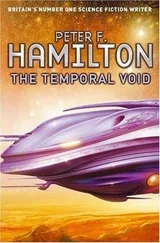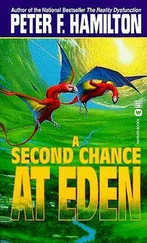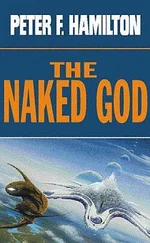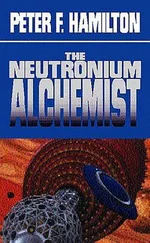Peter Hamilton - Pandora's Star
Здесь есть возможность читать онлайн «Peter Hamilton - Pandora's Star» весь текст электронной книги совершенно бесплатно (целиком полную версию без сокращений). В некоторых случаях можно слушать аудио, скачать через торрент в формате fb2 и присутствует краткое содержание. Жанр: Фантастика и фэнтези, на английском языке. Описание произведения, (предисловие) а так же отзывы посетителей доступны на портале библиотеки ЛибКат.
- Название:Pandora's Star
- Автор:
- Жанр:
- Год:неизвестен
- ISBN:нет данных
- Рейтинг книги:5 / 5. Голосов: 1
-
Избранное:Добавить в избранное
- Отзывы:
-
Ваша оценка:
- 100
- 1
- 2
- 3
- 4
- 5
Pandora's Star: краткое содержание, описание и аннотация
Предлагаем к чтению аннотацию, описание, краткое содержание или предисловие (зависит от того, что написал сам автор книги «Pandora's Star»). Если вы не нашли необходимую информацию о книге — напишите в комментариях, мы постараемся отыскать её.
Pandora's Star — читать онлайн бесплатно полную книгу (весь текст) целиком
Ниже представлен текст книги, разбитый по страницам. Система сохранения места последней прочитанной страницы, позволяет с удобством читать онлайн бесплатно книгу «Pandora's Star», без необходимости каждый раз заново искать на чём Вы остановились. Поставьте закладку, и сможете в любой момент перейти на страницу, на которой закончили чтение.
Интервал:
Закладка:
Behind the window, the dull silver rim of the oval gateway began to flicker with dusky turquoise shadows. They quickly expanded to merge together, at which point focusing on them became immensely difficult for the human eye. They shifted constantly while staying in the same place. In the center of the gateway, depth arrived with a giddy lurch. As always, Oscar got the impression he was abruptly hurtling forward through an infinitely long tunnel. Not a bad interpretation for beleaguered human senses. He knew he was holding his breath just like any rookie console operator. But this was the moment of greatest reward, the reason he committed himself to his job with such passion, the reason he’d made it all the way up to Operations Director. Despite all the commercial and political crap that was CST, this was a new world they were searching for today. Chances were, the human settlers would make it just another poor clone of the majority society within the Commonwealth. But there was always the possibility it would be something new and inspiring.It can’t always be the same.
The instability at the center of the gateway mechanism stabilized and cleared, darkening immediately. Stars appeared amid the blackness. A beam of brilliant white light stabbed through the opening, angled so it struck the chamber to the left of the windows.
A few digits jumped on the digital displays, registering the small electromagnetic infall. “Have we got a clear exit?” Oscar asked.
“Negative on gravity distortion sweep,” sensors said. “There’s no solid matter above particle level within a million klicks of the opening.”
“Thank you. Chamber Management, vent the chamber, please.”
A hole opened at the center of the secondary force field covering the gateway, and slowly expanded back toward the rim. The chamber’s atmosphere streaked out. It was visible at first, a thick jet of gray vapor playing across the starfield. After a minute, and with the force field withdrawn, there was nothing left but a few glittering grains of ice slowly dispersing.
“Vacuum confirmed,” chamber management said.
“Sensors, deploy the star tracker,” Oscar ordered. “Astronomy, tell us where we are, please.”
One of the recesses on the chamber ceiling silently irised open. A long tentaclelike arm of electromuscle uncoiled out of it, holding a two-meter metal bulb on the end. It was studded with small gold lenses. Oscar watched the arm slowly reach forward, its careful sinuous motion pushing the star-tracker mechanism out through the open gateway and into space beyond. A standard camera on the collar of the star tracker sent its image up to one of the five big screens above the windows. An ordinary star was revealed, its small disk shining bright amid the constellations. To Oscar it looked about the right size for an F2 at five AUs. Nonetheless, he waited patiently as information flowed in from the star tracker. Hasty decisions were just as dangerous as hesitation; one of the main requirements of his job was to keep calm in all circumstances. It was a trait he’d learned early in his first life, it just got misapplied back then.
“The spectrum matches AFR98-2B, sir,” short-range astronomy said. “Acquiring marker stars and measuring emergence point location.”
Oscar could remember the first stellar exploration he’d worked on, decades ago back on Augusta; as one of the junior prep crew he’d stood in the observation gallery for nine hours after his shift ended at handover. Nine hours that passed in no time the excitement he felt was so strong. It was the day he knew he’d made the right choice; that in some obscure way this was how he could make amends for what he’d done. This way he could bring the hope of a fresh start to other people’s lives as well as his own.
“Confirming location of wormhole exit,” short-range astronomy said. “Distance to AFR98-2B is seventeen-point-three million klicks out from the projected coordinate.”
Oscar allowed himself to relax a little, seeing the smiles springing up around the ground crew. That wasn’t a bad margin of error for a newly recommissioned gateway, well within acceptable limits. “Well done, Astrogration; load in the new figures please. Sensors, let’s get the planetary survey scope out there.”
While the new, bulkier telescope mechanism was deployed out through the confinement chamber, Oscar went around the control center loop again, verifying that everything was holding steady. Then it was an hour-long wait while short-range astronomy analyzed the images from the planetary survey scope. The procedure was simple enough: they scanned the plane of the ecliptic for any light source above first magnitude. When it found one, the telescope observed it for movement. If it was a planet, then its orbital motion should become apparent almost straightaway.
The results flashed up on the screens above the window. Short-range astronomy located five planets. Two were gas giants, Saturn-sized, orbiting eleven and fifteen AUs out from the star. The inner three were solids. The first and smallest, a lunar-sized rock one hundred million kilometers out from the star, had a high-viscosity plastic lava mantle moving in sluggish ripples generated by the star’s massive tidal pull. Second was a large solid, seventeen thousand eight hundred kilometers in diameter, and orbiting a hundred twelve million kilometers out. With its high gravity, Venusian-style atmosphere, and close proximity to the sun, it didn’t come anywhere near qualifying as H-congruous. But the third was a hundred ninety-nine million kilometers distant from the star, and measured fourteen thousand three hundred kilometers in diameter. Cheers and a patter of applause went around gateway control as the data slowly built up. Spectrographic results showed a standard oxygen-nitrogen atmosphere, with a high water vapor content. Given its distance from the star, it was somewhat cool, with the equator having the same temperature as Earth’s temperate zones in autumn or spring. But the information was sufficient for Oscar to award it a preliminary H-congruous status, which brought another round of applause. First time out with a recommissioned gateway, and they’d struck gold already. A good omen.
“Sensors, let’s get the dish out there,” Oscar said. “Check for emissions.”
Another electromuscle arm snaked out from its ceiling recess, carrying a furled dish. It went through the gateway beside the planetary survey scope, and extended its metal mesh.
“No radio signals detected,” sensors reported.
“All right, bring both the arms back in,” Oscar said. “Astrogration, move the wormhole exit to geosynchronous height above the third planet’s daylight terminator.”
When the arms were back in their recesses, the starfield winked out. A moment later, the gateway opened again, revealing the crescent of a planet directly ahead. Its radiance washed across the confinement chamber and in through the windows. Oscar smiled in welcome as the soft light fell across his console. The cloud cover was above average, cloaking a good seventy percent of the hemisphere. But he could see the blue of oceans, and the grubby red-brown of land, even the crisp white of polar caps was visible in that first glimpse.
“All right, people, let’s concentrate on the job,” Oscar said as excited conversation buzzed through the loop. “We’ve all seen this before. Sensors, I want a full electromagnetic sweep. Launch seven geophysics satellites, get me some global coverage. Planetary Science, you’re on; preliminary survey results in three hours, please. Alien encounter office, start hunting. Emergency Defense, you’re on stand-by alert, and now have full wormhole shutdown authority; acknowledge that, please.”
“Acknowledged, sir.”
The launch rail telescoped out from its storage bay below the control center windows, extending a good ten meters through the wormhole exit. Satellites accelerated down the rail, riding the magnetic pulses before whirling away along different trajectories. Once they’d fallen a kilometer from the gateway, their ion drives came on, pushing them into high-inclination orbits that would provide coverage of the planet’s whole surface. As they went, each released a swarm of subsatellites like golden butterflies, expanding their observation baseline. Tracking dishes were deployed to keep in contact. The big dish came out again, scouring the continents for any electromagnetic activity. A two-meter telescope peered down inquisitively.
Читать дальшеИнтервал:
Закладка:
Похожие книги на «Pandora's Star»
Представляем Вашему вниманию похожие книги на «Pandora's Star» списком для выбора. Мы отобрали схожую по названию и смыслу литературу в надежде предоставить читателям больше вариантов отыскать новые, интересные, ещё непрочитанные произведения.
Обсуждение, отзывы о книге «Pandora's Star» и просто собственные мнения читателей. Оставьте ваши комментарии, напишите, что Вы думаете о произведении, его смысле или главных героях. Укажите что конкретно понравилось, а что нет, и почему Вы так считаете.
